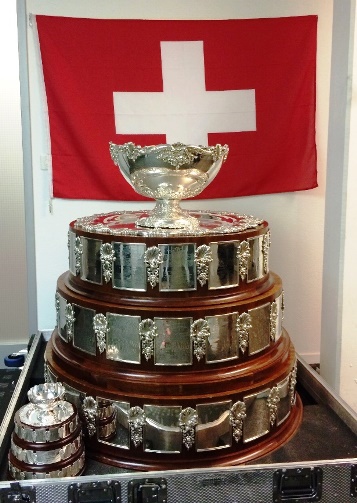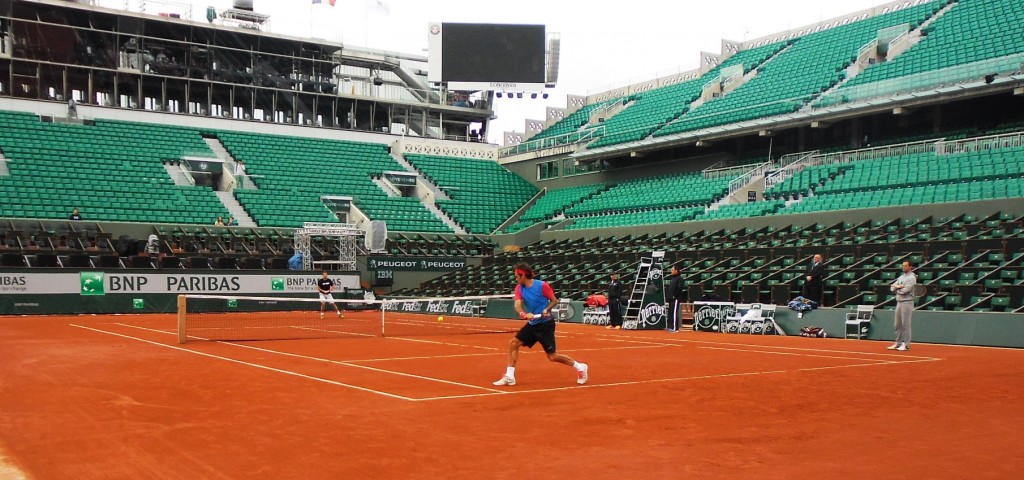
The first challenge that faced Clément was to nominate four players that were to represent the French team against the Swiss. He had an accomplished doubles team composed of Julien Benneteau and Édouard Roger-Vasselin, the winners of the 2014 Roland Garros title. Had he picked them, he would have had to leave out two of the following players out of the team: Jo-Wilfried Tsonga, Gilles Simon, Gaël Monfils, and Richard Gasquet. Furthermore, his head would have been hanging at the Place de la Concorde even before the weekend was over, had one of the two singles players that he picked got injured on Friday, and was substituted by one of the doubles players on Sunday, leading to an almost-guaranteed loss. He did what any reasonable coach would do. Unless you have an extraordinary doubles team, such as the Bryan brothers of the U.S.A., you go with your strong singles players who could collect four out of the five points that you need to win the tie, and hope that two of them can combine to provide a solid doubles effort.
Out of the four strong singles players mentioned above, two of them could also play doubles: Gasquet and Tsonga. In fact, they won a crucial doubles match against a formidable Tomas Berdych – Radek Stepanek in Davis Cup when they played the Czech team, and did reach the quarterfinals of the Toronto Masters 1000 having beaten a respectable Laender Paes – Stepanek team, only to withdraw in the quarterfinals. In contrast, Simon and Monfils are singles players. Clément wanted one doubles specialist on the team and he took Benneteau, a sensible choice. It is also reasonable that he picked the two singles players that could also play doubles, and chose only one out of the two other players who could play singles. Calm down Simon fans (and I happen to be one myself), but on clay, Clément’s choice to pick Monfils over your guy was completely understandable and justified.
Friday ended with a 1-1 tie, and displayed a version of Federer that represented a level situated somewhere between “terrible” and “mediocre” compared to his real one. None of the after-the-fact armchair experts could have predicted that Federer’s level would rise in the following 48 hours faster than the Enterprise accelerated from ¼ impulse drive to Warp Speed nine. Most believed that Tsonga and Gasquet would triumph over Wawrinka and Federer, and that is, if Federer played doubles in his limited condition.
However, on Friday two things happened that were completely outside the control of either captain. First, Tsonga injured his wrist which caused him to withdraw, by his own request, from the doubles. Second, Federer played through his match against Monfils with no pain in his back, and although he got crushed by the Frenchman, he was unusually upbeat about the rest of the weekend. Clément once again made the only reasonable decision: replace Tsonga with Benneteau, and thus, put his two best doubles players on the court. Gasquet and Benneteau did not play bad, but Wawrinka and Federer played the kind of sensational doubles that they have not played since their run to the gold metal back in 2008 Olympic Games. Three sets later, Switzerland took a 2-1 lead in the tie, and everything went from bad to worst on Sunday when Federer put up one of his better clay-court performances in the last few years, running Gasquet around and finishing the points with remarkable shot-making skills.
Just like that, the Swiss won the Davis Cup, and the Statlers and Waldorfs of the world came out in numbers, ready to guillotine Clément. Yet, once again, Clément’s choices were not only the most reasonable ones to make, but as seen above, the only ones he could make in certain cases. It was one of the most unfortunate weekends for a Davis Cup captain that I have ever witnessed, because it contained every twist needed to transform it into the “festival of blame” that followed the next few days in the French tennis circles.
Unfortunately for Clément, if someone wanted to write a script to make him look bad at the end of the day, they could not have done a better job. First, the controversy surrounding the Swiss team, involving the Wawrinka-Mirka malaise on the preceding weekend in London, followed by the unexpected injury of Federer that caused him to withdraw from the finals against Novak Djokovic, made the Swiss team look beatable and demoralized, thus giving the impression that the French had the psychological upper hand. Second, the fact that the French had two weeks of preparation on clay, versus the less-than-a-week preparation time for the Swiss, not to mention that Federer had a total of one hour and twenty minutes of total practice time before Friday’s first match, added to the impression that the French had all the necessary elements tilted to their advantage. Last, the aura of having a team composed of Monfils, Tsonga, and Gasquet, that has never lost at home, firmly put the French in the favorite category in the perceptions of many, although reality was the opposite, at least on paper. These factors combined to create a firm belief by the French that losing to Switzerland on that particular weekend in Lille would be considered nothing less than a debacle. Clément ended up in the position of a captain who would either be doing only what was expected had France won, or face the prospect of being profiled as a failure in the case of a loss. Unfortunately for him, the latter took place.
Fortunately for him, however, the French Tennis Federation recently consulted the players, and they stood tall behind Clément, ensuring that he retains his captaincy. Today, The French Tennis Federation confirmed that Clément will continue to serve as the captain, for at least two more years. It must be a relief to the ex-Australian Open finalist, knowing that over the weekend, Yannick Noah expressed his disappointment over the loss and explicitly verbalized his interest to become the captain if given the opportunity. Clement did not take that lightly and struck back at Noah with criticism of his own, saying that he takes the 1983 Roland Garros champion’s words as an attack against him, and that things in reality are not the same as they may have appeared to Noah on the TV screen. Personally, I am a big fan of Yannick Noah, and he has already proven to be an astute Davis Cup captain in the past (remember 1991 and his decision to play Henri Leconte in singles). Yet, I can’t help but agree with the players in Clément’s case, and disagree with the members of the “armchair crew,” including Noah, who have the luxury to speak in retrospect unlike the captain.
Clément did carry them to the finals and the French need to understand that for one weekend in November, they faced a Swiss team that had superior skills and better level of quality in their tennis than they did. Donned with the number two and four players in the world, and one of the most underrated coaches in tennis (Severin Lüthi), the Swiss lived up to their potential under very difficult circumstances. Considering Wawrinka’s form and Federer’s quick recovery, followed by his excellent level of play on Saturday and Sunday, I am not sure if Clément would have coached his team to victory, even under the best of circumstances. Davis Cup captains sometimes do commit mistakes and fail, and even deserve to be fired in extreme circumstances. But the loss against Switzerland two weekends ago was not one of those cases. Clément should rightfully remain in his position and deservedly get another chance to lead his team in 2015.
 Little did Federer & Wawrinka know on May 23rd, during this early morning practice on Philippe Chatrier court, that exactly six months from that day, they would be lifting the Davis Cup trophy together!
Little did Federer & Wawrinka know on May 23rd, during this early morning practice on Philippe Chatrier court, that exactly six months from that day, they would be lifting the Davis Cup trophy together!

Hi Mert – I completely agree with your assessment about Clement and his choices in the final. It’s easy to criticise him with hindsight but given the circumstances, I also don’t think his player selections were wrong.
I do find it very interesting and ironic that given the contrast between the depth in French team (6 players in top 30 singles and Benneteau is currently the best player with a combined singles + doubles ranking) and lack of depth in the Swiss team (essentially a two man team with Chiudinelli and Lammer ranked 214 and 534), it was the French who had more trouble with team selection after Tsonga’s injury and were criticised more for their team choice retrospectively.
For me, three things stood out from these finals:
One: It was a great weekend for tennis and Davis Cup is still a very relevant and landmark event – showcased by consecutive record crowds exceeding 27,400 spectators per day, the way both Swiss and French crowds got into it, importance of the doubles match and seeing 2 great singles players playing high class doubles, seeing 3 of the most beautiful single-handed backhands on the same court and seeing Federer’s tears showing how much this has meant to him regardless of his all other achievements.
Two: I think the potential fifth rubber between Monfils and Wawrinka on the final day will be known as ‘the best match of the year that was never played’. Given Monfils’ “space tennis” display on Friday (the guy could do no wrong) and Wawrinka’s form against Tsonga and then in doubles, it would have been a spectacular finish if this was the rubber that decided the tie and the last match of the season could have been the best one. However, the finals still got a great and dramatic finish as it ended so not too many regrets there.
Three: The final point sums up everything that’s great about the Davis Cup for me – it’s the fact that a player ranked 534 in singles and 531 in doubles (Michael Lammer) now has and will always have his name etched on the ‘salad bowl’ (Davis Cup trophy) next to Borg, McEnroe, Lendl, Wilander, Edberg, Sampras, Agassi, Nadal, Djokovic, Federer and many other tennis greats – that’s what makes Davis Cup beautiful.
Great comment Selim..
With regard to Lammer and Chiudinelli, I find that a “benched” player contributes to success in Davis Cup, a lot more than a “benched” player in other popular team sport (i.e. the guy who never saw playing time in an NBA World Champion team)
Yes, the record crowd was something to behold.. Many soccer/futbol/football (depending on where you are) matches don’t get close to that number in attendance. It was also the most hyped Davis Cup final in a while for several reasons among which, Federer playing for the Swiss, that it took place in France where Davis Cup is revered, and that the average Swiss would hate to lose to an average French and vice-versa..
I also agree with the “the best match of the year that was never played” tag for the Wawrinka-Monfils final rubber. That was like being offered a private luxury jet to fly to some island, and on your way to the airport, you learn that it exploded that morning…